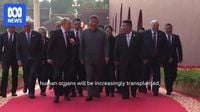On September 3, 2025, in the heart of Beijing during a grand military parade, an unguarded moment between two of the world’s most powerful men offered a rare glimpse into their personal ambitions—and perhaps their deepest anxieties. Russian President Vladimir Putin and Chinese President Xi Jinping, both 72 years old, were caught on a hot mic discussing a topic as old as civilization itself: the quest for immortality.
“People rarely lived to be over 70, but these days, at 70, you are still a child,” Xi remarked, with a wry smile, according to microphones present at the event. Putin, not missing a beat, mused about the advances in biotechnology, noting how human organs could now be replaced and people might one day live forever. Xi, ever the pragmatic visionary, added, “Maybe even in the 21st century, people would live to 150.” The exchange, while seemingly casual, was anything but trivial. Both men are not only outliers in terms of age among global leaders but also in their apparent unwillingness to relinquish power, making their musings on longevity all the more significant.
According to The Atlantic, the conversation was more than idle banter. It reflected the leaders’ contrasting approaches to the idea of immortality—one rooted in personal survival, the other in historical legacy. Putin, who is nearing the average Russian life expectancy, has demonstrated a fixation on extending his own lifespan. In early 2024, he announced the “New Health-Saving Technologies” initiative, a state-backed project focused on geriatric medicine. By June 2025, the Russian Ministry of Health was soliciting rapid proposals on aging and bioprinting, including the potential for replacing human organs with 3D-printed models made from organic materials.
But Putin’s ambitions don’t stop at the merely scientific. He has elevated pseudoscientific figures to prominent scientific roles, notably Mikhail Kovalchuk—a genetic engineering enthusiast who has claimed nanorobots could make people immortal and expressed paranoia about Western powers stealing Russians’ bodily fluids. After Kovalchuk was denied higher office by the Russian Academy of Sciences in 2009, Putin retaliated by weakening the Academy’s influence in 2013, according to The Atlantic. Another Putin-backed theorist remarked, “Scientists love to discuss the problem of human immortality,” highlighting how these ideas have found currency at the highest levels of Russian power.
China, by contrast, presents a different story. Xi’s health, like that of all Chinese leaders, is shrouded in secrecy. Rumors swirl—secret smoking, possible gout, and occasional absences from public view—but nothing is confirmed. Unlike Putin, Xi has not publicly championed radical scientific projects aimed at individual immortality. Instead, under his leadership, China’s scientific ambitions have been pragmatic, focusing on manufacturing and energy rather than speculative biotechnology. While China boasts its share of scientific mavericks—some even dabbling in ethically dubious territory, like the infamous case of geneticist He Jiankui—such figures have not received official endorsement, and some, like He, have faced jail time for violating medical regulations.
Yet, as Der Spiegel points out, the Chinese cultural imagination has long been fascinated by the idea of immortality. Daoist thinkers, centuries ago, sought physical immortality through spiritual practices and alchemical potions—often with tragic results. Mercury, lead, and arsenic featured prominently in these concoctions, and at least half a dozen Chinese emperors are believed to have died from elixir poisoning. The Jiajing emperor, for instance, became notorious for his obsession with a “red lead” potion, which ultimately contributed to his early death and a failed assassination attempt by his abused concubines.
But physical immortality, tainted by its association with failed emperors and dangerous mystics, gradually gave way to a more respectable ideal: self-apotheosis. As historian Michael Puett has written, early Chinese emperors believed that through the right rituals and conquests, they could ascend to Heaven and achieve a kind of divine immortality. This idea was less about living forever in the flesh and more about securing a place in the annals of history—a notion that seems to resonate with Xi’s own ambitions. His drive to restore national greatness, pursue a “moderately prosperous society” by 2030, and even eye the reunification of Taiwan, can all be seen as efforts to achieve a kind of figurative immortality.
The Russian tradition, too, is steeped in dreams of conquering death. In the early 20th century, Russian philosopher Nikolai Fyodorov argued that true socialism would require not just equality in life, but also the abolition of death itself. The biocosmists, a group active in the 1920s Soviet Union, took this further, envisioning a future where technology would resurrect the dead so all could share in socialist justice. The Soviet state even experimented with blood transfusions as a path to rejuvenation, as chronicled in Alexander Bogdanov’s 1927 text The Struggle for Vitality. These efforts, of course, fell short—Lenin’s embalmed body remains a silent testament to the limits of science and the persistence of political myth.
According to Der Spiegel, the obsession with immortality is not unique to Russia or China. Dictators, the magazine argues, are particularly susceptible to what philosopher Hans Blumenberg called the “gap” between an individual’s finite lifetime and the endless march of world history. The urge to bridge this gap—to leave a mark that endures beyond death—has fueled megalomaniacal projects from Hitler’s doomed quest for a thousand-year Reich to Mao’s tumultuous campaigns. Putin and Xi, in their own ways, are heirs to this tradition.
But the pursuit of immortality, whether biological or political, has its dark side. As Der Spiegel notes, “the flip side of the dictatorial will to eternal life is the death of others.” Putin’s war in Ukraine and Xi’s crackdown on Uyghurs in Xinjiang are cited as grim examples of leaders willing to sacrifice countless lives in pursuit of their own legacy. In the words of Boris Groys, these utopias can devolve into a “society of vampires,” where the ruler’s quest for immortality comes at a terrible human cost.
At a press conference following the Beijing parade, Putin confirmed that he had indeed discussed longevity not only with Xi but also with the late Italian leader Silvio Berlusconi, who was known for his own efforts to defy aging. When Slovak Prime Minister Robert Fico asked Putin how he was doing, the Russian president replied, “As long as I’m alive, I’m fine.”
Whether the conversation between Putin and Xi was a calculated message to the West—signaling their intention to remain in power for years to come—or simply a candid reflection on their own mortality, it underscored a timeless truth: the drive to outlast one’s own era, to become more than a footnote in history, is as potent now as it was in the days of emperors and revolutionaries. And for these two leaders, the quest for immortality—be it literal or symbolic—continues to shape the destinies of their nations and the world.





